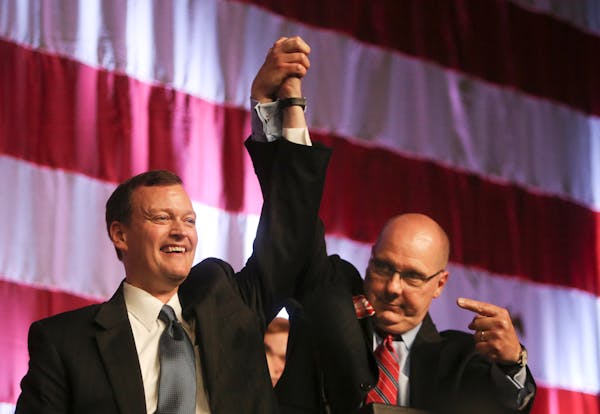DULUTH – Sen. Al Franken had just arrived in Washington after winning the closest Senate race in the country when he got some advice from a former Hillary Clinton aide: Duck the showy theatrics and dig in on substance.
Six years later, Franken has an array of legislative achievements that show he heeded that tip: He successfully passed new rules for health insurance companies. He wrote a section on renewable energy into the farm bill. He launched an investigation into Apple's creation of unencrypted files of user's locations on iPhones.
But these topics don't tend to fit neatly onto a bumper sticker or easily become crisp sound bites.
And now some of the same Republicans who once derided Franken as a lightweight comedian sense new political opportunity in his dogged and low-key embrace of complex policy questions.
In accepting the DFL endorsement for a second term on Saturday, Franken told delegates in Duluth that he is not interested in having a flashy style in Washington.
"It's not about getting on TV," Franken said. "It's about seeing what Minnesotans are doing right and seeing what they need and getting it done."
Franken, 63, also vowed to win by "more than last time," a reference to his razor-thin victory margin of 312 votes.
Aaron Brown, a liberal blogger and radio show host from Bovey, Minn., said Franken has some work to do.
"I think he has wide support, but not very deep support," Brown said. "He's the stable and moderately amusing, but never funny guy who really cares and seems sincere. That's his big political victory. He's crafted that image."
John Ongaro, a DFL official in St. Louis County, was more concise: "It's almost like he's gone out of his way to be too serious," he said.
And with national polls at this point favoring Republicans in the midterm elections this fall, an opponent such as newly endorsed GOP Senate candidate Mike McFadden could see an opening to deny Franken a second term. In a February Minnesota Poll, Franken had a 55 percent approval rating, but his job performance had slipped, with 34 percent saying they disapproved, up from 29 percent last summer.
Franken carries the added burden of knowing that in a closely divided Senate, a continued Democratic majority could hang in part on his re-election.
"I had something to prove when I got in there," Franken said, in an interview before his nomination Saturday. "I came in there with some parallel challenges. I was something of a celebrity, so my Democratic colleagues, I think, were probably skeptical that I was going to take the camera time and the Republican colleagues knew me from the commentary I had done that was critical of them."
On Capitol Hill, Franken has plunged into problems he said he cared about deeply even before he was elected, including privacy and promoting support for schools to treat kids with mental health problems.
In some cases, he tackled an issue first and then found a Minnesota constituent who had a problem. In 2011, for example, he went after cellphone "stalking" apps and their location-tracking services. After touting the policy for a few weeks on Capitol Hill he heard about a northern St. Louis County woman whose abusive husband figured out that she had gone to a safe house and then a courthouse to get away from him.
"I did not know when I started this, but it does tie very closely to certainly this woman," he said. "And women in Minnesota."
In the past six months, Franken has championed even more complex issues, including opposition to the Time Warner/Comcast merger, which he warns could raise cable bills for Minnesotans, and a recent Federal Communications Commission decision on net neutrality that he calls "the free speech issue of our time."
But those are not the issues central to Peter Wood, co-owner of Wood Forest Products Inc., a logging operation in St. Louis County about 25 miles from Duluth. Wood, who sells ash, aspen, birch and maple lumber to paper mills, said he worries more about federal regulations affecting his business; specifically federal weight limits on trucks that restrict how he delivers his wood to his clients. Former GOP Rep. Chip Cravaack backed legislation in the House in early 2012 to ease weight limits, but it never went anywhere in the Senate.
"What has he really done to help me here?" asked Wood, who supported Franken's opponent in 2008.
Franken's seat is considered safe for now by national Democrats, but some DFL leaders are openly concerned about how motivated their voters are, particularly in the northern half of the state. Their task is to get working-class 30- and 40-somethings — particularly in the Seventh and Eighth Congressional Districts — to understand Franken and Gov. Mark Dayton's accomplishments and get them excited enough to vote in off-year elections where turnout tends to lean Republican.
Hard work ahead
"These races are not foregone conclusions. I like to remind people that the two guys at the top of the ticket won by recount," said DFL Chairman Ken Martin. "We have a lot of hard work to do."
Part of that work is reintroducing Franken — and his Washington work and accomplishments — to Minnesota.
His own campaign's first television ads suggest that he is looking for ways to show how the issues he's tackled affect ordinary Minnesotans. One ad features a self-avowed Republican woman who suffers from meningitis, sitting at a kitchen table talking about a bill Franken promoted that cracked down on unsafe pharmaceutical practices.
On the Iron Range, former DFL state Rep. Tom Rukavina, who is running for St. Louis County commissioner from Virginia, said he thinks Franken "will probably do just fine."
"We depend on logging and mining for a living," he said. "Franken's been sensitive to that. Do I wish he was stronger about some things? Yeah. But he's been satisfactory to me. He's not shied away from saying he believes copper nickel mining can be done properly."
Twenty-six-year-old Stefan Heikel is a personal care assistant and graduated from the University of Minnesota Duluth but is having trouble finding work. He makes calls on Franken's behalf in a strip mall here a few nights a week.
"He stands for young people, as a gay man he stands for me," Heikel said, taking a stretch and Dorito break after calling voters on the Range.
What kind of reaction is he getting?
"The biggest issues are health care, still, and education," Heikel said. "It's mixed."
Allison Sherry • 202-383-6120e t
New Black congressional district in Louisiana bows to politics, not race, backers say
Trump trial jury selection process follows a familiar pattern with an unpredictable outcome
Climate change concerns grow, but few think Biden's climate law will help, AP-NORC poll finds

